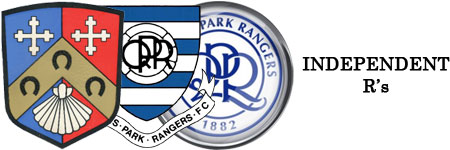The following is an extract from the tribute made by Chris Salewicz in ‘The Independent’ to Rob Partridge who was also an R’s fan. Rest in Peace.
In his time at Island, Partridge revealed himself to be a sardonic but kindly man who genuinely loved great music and delighted in helping bring it to the ears of the world. As well as discovering U2 and eventually personally making the phone-calls that announced the death of Bob Marley in May 1981, he helped create the fascinating images of some of the world’s top talents including Tom Waits, Grace Jones, Robert Palmer, Stevie Winwood, Salif Keita, Courtney Pine and latterly, in a management role, The Streets.
After leaving Island Records in 1991, Partridge founded Coalition, a public relations and management company, which by the time of his death (after a two-year battle with bowel and liver cancer, the progress of which he observed with wry humour), he had turned into a business with a seven-figure turnover. “Not bad for a boy from a Secondary Modern who decided there was an opportunity for himself,” said David May, a friend – and later Sunday Times News Editor – who shared a desk with Partridge at Primary School in Plymouth and recalled how he introduced him to both the writing of Marshall McLuhan and the music of Miles Davis when they were 16.
That early knock-back of failing his 11-plus exam seems to have acted as a springboard. Gaining admission to a Grammar School – where he blossomed – when he was 13, Partridge fell in love with what seemed an unlikely combination of the media and pop culture. Still at school, a stylish Mod who would hitchhike to London to buy new trousers, he had a weekly column in the Plymouth-based Sunday Independent. His first piece was an article about the writer Tom Wolfe. Leaving Secondary School, he became the only non-graduate on the 1967 IPC trainee scheme, a coveted beginning to a career in journalism.
Working on the Torquay Times, he undertook a short-hand course on which he encountered the 18-year old Tina Lilavwala. They were first formally introduced at an Alexis Korner gig, Partridge’s greeting displaying a rather brash young man: “Hello, darling,” he said. “Want an orange ?” Then he asked Tina if she would like to go backstage and meet the star, hardly the last time in his life he would make such an offer. They married in 1970, remaining together for the rest of his life – later he confessed to having been wary of the temptations of the world in which he moved and steadfastly refused to fall for its glamorous allure.
Moving to London, he took a job as a reporter on Record Mirror. Soon he moved to its sister publication, Music Week, the music business paper and became News Editor. When Melody Maker, the leading music publication, offered Partridge a similar post, he took it immediately. As a News Editor sometimes he’d sit on a hot story because he was aware that down the line that might lead to an even bigger story. Partridge had long admired Chris Blackwell, the founder of Island Records and the feeling was reciprocated. “He was one of the most honourable men I have ever met in my life,” Blackwell said of him. During the 1970’s, Island was enjoying a golden era, thanks to Punk, Reggae’s popularity was exploding. A long-time fan of Queen’s Park Rangers, Partridge loved setting up football teams for Bob Marley and his crew to play against.
After Marley played his last UK concert, at Crystal Palace in July 1980, Partridge took Chris Blackwell to a pub in South London to watch U2, a new group he had found. “He not only had an eye for upcoming talent,” said Bono, “he was a nurturer, a person who would educate you about the kind of obstacles you were going to meet and how to get over them.” In July 1989, Blackwell sold Island to Polygram. Partridge remained with Island but left at the end of the following year to set up his own company. Accustomed to the demands of the Marley Estate, Partridge took on similar legacies, adding the archives of Elvis Presley, Jimi Hendrix and Roy Orbison, re-branding and re-marketing them. He was an instigator of the Mercury music prize and he continued to work with old friends like Tom Waits and Marianne Faithfull, as well as Billy Bragg and demanding new acts like the Libertines, Kings of Leon and the Charlatans.
During a strategy meeting in 2003 for Joe Strummer’s posthumous Streetcore album, Partridge suffered a heart attack. When diagnosed two years ago with cancer, he took great pleasure in the experimental nature of his science-lab treatment, delighted that he would be the first UK patient to be treated by what he described as the cancer cells being “nuked”, a process employing nuclear radiation. Late last year he was told that this would give him a 50-50 chance of survival.
Robert John Partridge, journalist, public relations executive and band manager: born Plymouth, Devon 2nd June 1948; married 1970 Tina Lilavwala; died London 26th November 2008.
Chris Salewicz

There was also a very good obituary for Bob Partridge last night on Radio 4..The Last Word.
RIP Bob